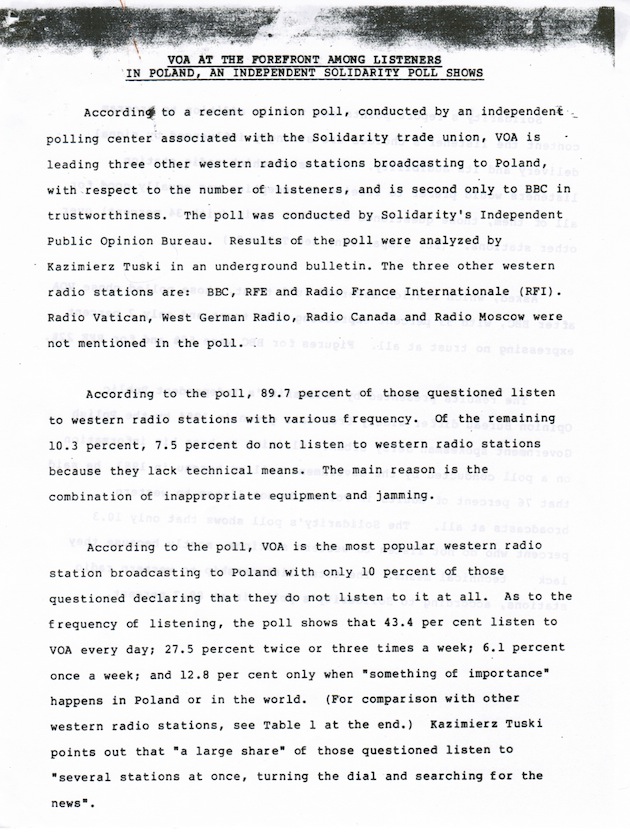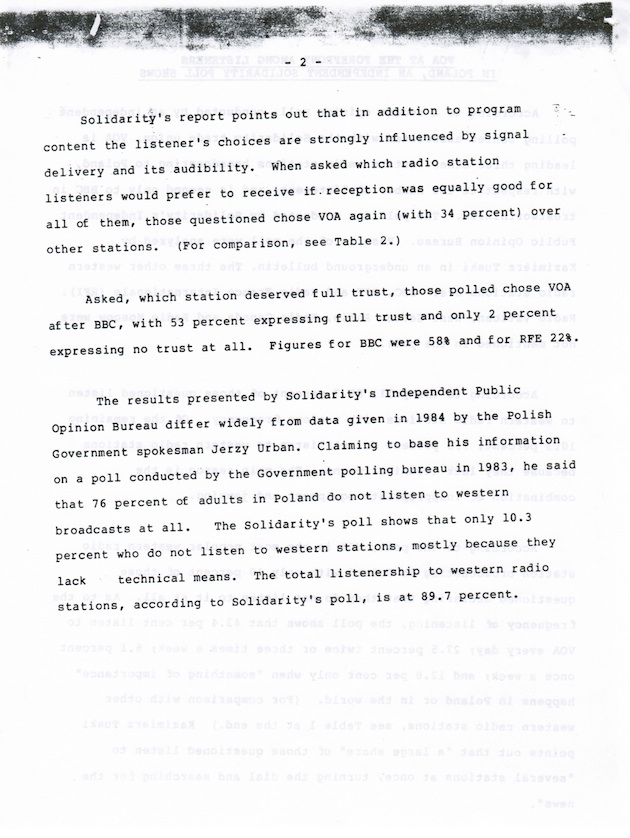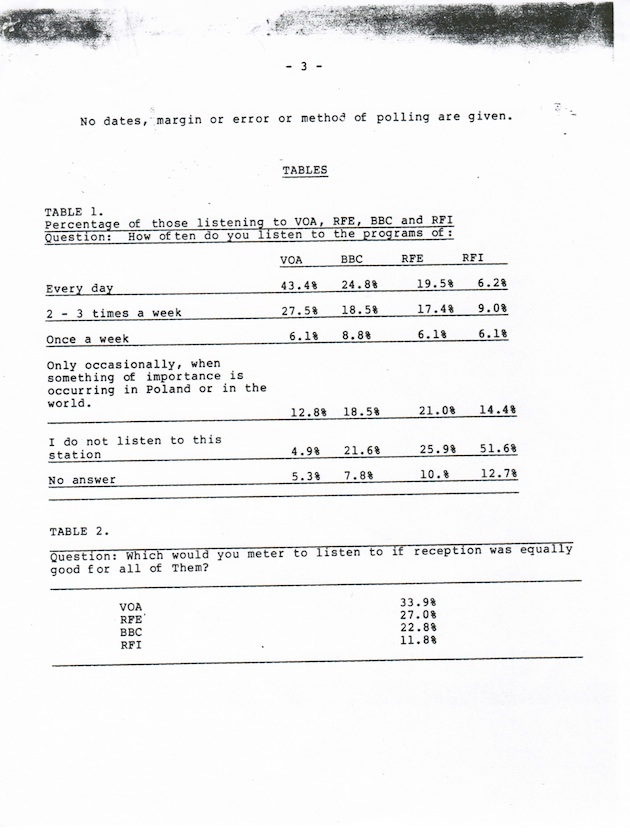BBG Watch Commentary
This commentary was provided by Ted Lipien, director of the independent Committee for U.S. International Broadcasting (CUSIB – cusib.org).
IBB’s Kim Andrew Elliott is wrong on USIA’s record at Voice of America
by Ted Lipien
I was surprised by Mr. Kim Andrew Elliott’s implied assertion that the United States Information Agency (USIA) made it impossible for the Voice of America (VOA) to have journalistic credibility and to attract a significant audience. In his blog comments, Mr. Elliot attacks Robert Schadler’s article in US News & World Report, “14 Years of Undermining Public Diplomacy.” While Mr. Elliott strongly denies it with a disclaimer on his blog, some VOA journalists and others believe that on many agency issues he is a surrogate for his superiors at the International Broadcasting Bureau (IBB).
“As for US international broadcasting, I’ve written before that, as a VOA broadcaster, I miss USIA about as much as a Lithuanian misses the Soviet Union. Under USIA, VOA was sometimes pushed toward one editorial line, then pushed towards another editorial line. It was sometimes loosely controlled, and sometimes tightly controlled. Many VOA managers were rotated USIA foreign service officers, some who embraced the journalistic mission of VOA, and some who did the opposite.
Under USIA, VOA was not consistently independent. Without independence, an international broadcasting effort cannot achieve credibility. Without credibility, there will be no audience. The audience for international broadcasting is seeking real news, not public diplomacy.” Kim Andrew Elliott in “Latest in the bring-back-USIA-and-put-USIB-back-under-it occasional series,” Kim Andrew Elliott reporting on International Broadcasting, posted 08 Oct 2013.
In my experience — I was in charge of the Voice of America Polish Service in the 1980s during Solidarity’s struggle for democracy when VOA was under USIA — I encountered results that were exactly opposite of what Mr. Elliott’s comments might suggests. These results — extremely high level of audience reach for VOA and high credibility in Poland — were confirmed by audience research from USIA, Radio Free Europe, and an independent Solidarity poll conducted in 1986.
I should add that I was never a Foreign Service Officer but was trained as a journalist and have worked as a journalist and radio and television broadcaster for over 30 years — at VOA under USIA, at VOA under IBB, and as an independent journalist, blogger and book author.
As an audience research analyst, Mr. Elliott could have tried to do more of his own research and to find audience research results for VOA from the USIA period. Results for Poland were not vastly dissimilar to what audience research showed for most countries in Central and Eastern Europe at that time.
As an example, an independent polling center associated with the Solidarity trade union conducted an underground poll in 1986 which showed that 77% of Poles were frequent listeners (at least once a week) to Voice of America Polish Service programs. BBC had 52%, RFE – 43%, Radio France Internationale – 21%.
The survey also gave listener preferences if reception conditions for all radios were equally good, since VOA at that time had better reception on medium wave (AM) in Poland than RFE had on its AM frequency:
VOA – 34%
RFE – 27%
BBC – 23%
RFI – 12%.
Asked, which station deserved full trust, 58% chose BBC. But 53% also chose VOA, and 22% chose RFE. Only 2 percent expressed no trust at all. It was my impression that while the general population listened more to VOA, underground Solidarity leaders and activists listened more to RFE, which had a much larger network of news sources in Poland.
These Solidarity poll results were generally confirmed by USIA and RFE audience research. RFE’s own research also showed the growth of VOA audience in Poland — from 22% in 1980 to 44% in 1984.
These results were achieved when the Voice of America was part of the United States Information Agency.
When in 2002, former Solidarity leader, Nobel Peace Prize laureate and by then also Poland’s former President Lech Walesa said “It is not conceivable that it would have happened so quickly and so effectively [the fall of communism and return of democracy] if not for the Voice of America,” he was talking about VOA that was operating under USIA.
Frankly, I do not think it mattered one bit to Walesa under what administrative arrangements VOA and RFE were functioning. They did their job. Walesa and others also knew very well that the United States Government stood behind both VOA and RFE. And yet, they both had credibility with the audience, which — according to Mr. Elliott — should not have been possible.
I do not want to create an impression that there were no attempts at interference with editorial content from USIA officers — I described them in my article in the American Diplomacy magazine, “Interweaving of Public Diplomacy and U.S. International Broadcasting: A Historical Analysis” — but they were relatively rare, especially in the final years of USIA’s existence. In my case, I was able to reject or ignore all USIA program content requests.
I therefore strongly disagree with Mr. Elliott’s attack on USIA’s historical record and his assertion that USIA was not missed by VOA journalists, especially those in the language services. I and many of my colleagues missed USIA after we realized that IBB was far worse. Many of my friends at VOA tell me that the state of VOA has never been as bad as it is now.
There were USIA officers at VOA who did not understand VOA’s journalistic culture and were difficult to deal with. But many others were good, and some were excellent. They brought with them knowledge of foreign policy, foreign cultures, and human rights issues that I could not find among IBB executives who took over from them when USIA disappeared. When I returned to VOA in 2003 and held a number of managerial and executive positions, I found VOA’s journalistic/editorial independence to be much more limited than it was under USIA, employee morale far lower, and general confusion about the mission. It is no accident that former BBG member with foreign policy experience, Ambassador Victor Ashe, was the first one to alert the rest of the BBG Board to a major management crisis at Radio Free Europe / Radio Liberty (RFE/RL) and a public diplomacy disaster in Russia in 2012, while IBB executives stood idly by.
While none of us were happy with USIA’s occasional attempts at editorial control, which as I already made clear earlier were not very frequent or successful, they were nothing compared to mismanagement and very successful editorial interference from International Broadcasting Bureau (IBB) executives and some former Broadcasting Board of Governors (BBG) members and their executive staffers.
Ask almost any VOA journalist with some historical knowledge and they will tell you that the quality and objectivity of VOA news reporting was far superior under USIA, especially in later years, than it is now. These days China’s Xinhua and the Voice of Russia can post a far more accurate, balanced and comprehensive news report from the White House than the VOA Central Newsroom web desk. These foreign media outlets won’t do it in every case and they will be biased where it counts for their governments, but there is no denial that VOA news operation is defunct — a term used by Former Secretary of State Hillary Clinton.
I very much doubt that this would have happened if the Voice of America was still associated with USIA, and USIA still existed.
Obviously, media environment now are vastly different than it was in the early and mid 1980s, but in the late 1980s and in early 1990s, VOA and Worldnet were already co-producing television news programs with national TV networks in Poland and in other countries in Central and Eastern Europe. Satellite television was already making a big impact.
I completely agree with those who point out that audiences in the Middle East, for example, are very different from audiences in Central and Eastern Europe under communism and Soviet domination and require a somewhat different programming approach. But I don’t buy the argument that you can fool them as to who is funding U.S. media outreach by changing names or pretending that a “private” corporation is not ultimately part of the overall American public diplomacy effort.
I also do not buy arguments advanced by Mr. Elliot and some of his IBB superiors that one could turn the Voice of America and the rest of U.S. International Broadcasting into some kind of global news service with BBC-like or NPR-like effectiveness and credibility. This is simply not part of the American media and political tradition, as we have seen with highly negative public responses to the recent modification of the Smith-Mundt Act, which IBB blindly supported without thinking about domestic political consequences. (I am not opposed at all to all USIB content being in the public domain but have issues with how IBB executives have handled the Smith-Mundt modification.)
CUSIB has very little faith in any kind of central bureaucracy, government or private, trying to tightly control VOA and surrogate broadcasters. We are strong supporters of independent surrogate broadcasters where they are truly needed and if they do a job that is different from what VOA is doing. In most cases, they do.
What I also see is a near total central management collapse under the agency’s strategic plan favored by Mr. Elliot and his IBB superiors. I would not trust IBB executives with running any kind of centralized U.S. international media outreach, whether “private” or government-affiliated. I never expected to see a Xinhua and Voice of Russia news report from the White House that is more accurate, more balanced, and more comprehensive that a VOA report, but it happened not just once.
VOA’s inability to engage audiences through social media is now easily seen on every VOA news report, which is posted online late and with minimal amount of information, or without balance. The vast majority of VOA English top news stories barely get a dozen or two Facebook “Likes” compared to thousands for Russia Today, BBC and Al Jazeera.
To imply, as Mr. Elliott does, that the USIA period in VOA’s history was a disaster in terms of audience size and credibility, is simply wrong, and his implied assertion is not supported by research.
In my opinion, the Voice of America would actually benefit in terms of domestic political support and in terms of good management from an affiliation — not with the State Department — but perhaps with another government agency, or a new government agency like USIA focused on public diplomacy abroad. I do hope that new BBG Chairman Jeff Shell, BBG’s new members — Matt Armstrong, Ambassador Ryan Crocker, and Kenneth Weinstein — together with Susan McCue and Michael Meehan will be able to reform U.S. International Broadcasting, or U.S. International Media as it should be called, but not along the lines being suggested by Mr. Elliot and his IBB superiors. I am glad for the actions BBG members took to reform RFE/RL and to hire Kevin Klose.
Noonan’s article in Radio World can be accessed at these links:
http://www.nxtbook.com/nxtbooks/newbay/rw_20131009/index.php#/28
http://www.nxtbook.com/nxtbooks/newbay/rw_20131009/index.php#/29
As to Mr. Elliott’s unwarranted attack on Ann Noonan’s recent Radio World article, I would only say that Mr. Elliott’s comments, together with the propagandistic title of his article, “Advocacy group for US international broadcasting advocates keeping things much the same,” represent almost a total distortion of CUSIB’s positions. Ms. Noonan is an outstanding rights campaigner and NGO executive who has made great public service contributions to improve oversight, transparency and accountability of U.S. International Broadcasting. Without her efforts, RFE/RL may not have been saved from misguided personnel and programming decisions that almost destroyed Radio Liberty’s social media outreach and its reputation in Russia.
Contrary to Mr. Elliott’s assertions, CUSIB is not advocating keeping things much the same. We are calling for a major management reform and realignment of USIB, starting with Mr. Elliott’s own employer, the IBB, which in our view should be abolished for making USIB both “dysfunctional” and nearly “defunct” — again to use terms employed by former Secretary of State Hillary Clinton, who herself was a BBG member.
I’m not saying that Mr. Elliott is personally responsible for any of these failures, but in his blog he often defends plans and ideas advanced by his IBB superiors that have caused the current crisis.
I wanted to set the record straight on these points, since Mr. Elliott does not accept comments on his website, which he calls private despite appearing to be the only IBB employee who can publish his private views on agency issues while other current and former employees who have published their own views different from the party line have met with reprisals and attacks on their professional reputation from IBB and VOA managers.
Maria Bnińska: What does the 50th anniversary of the Voice of America mean for you?
Lech Wałęsa: I think, it is the present victory; its role in this victory.
At the same time, it is contribution to general knowledge, my own and for generations that lived through this period.
Many did not see the effects of their work.
We must remember many, in history and in everything else; they have made a great contribution.
This is, I think, for today the great contribution of the Voice of America.
Maria Bnińska: Co dla pana oznacza i czym jest dla pana piędziesięciolecie (2002) Głosu Ameryki?
Lech Wałęsa: No myslę, że obecnym zwycięstwem, udziale w tym zwycięstwie.
Jednocześnie jest to uzupełnieniem wiedzy ogólnej, tak moim jak i pokoleń, które w tym okresie przewinęły się.
Wielu nie doczekało efektów swojej pracy.
O wielu musimy pamiętać, i w historii i w tym wszystkim, że mają wielki wkład.
To tym, myslę, tylko i wyłącznie na dzisiaj jest ta wielka zasługa jaką jest Głos Ameryki.





Comments are closed.